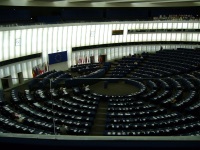Trefor Davies of trefor.net commissioned and published an article by me on the state of the politics of digital and its likely impact on the General Election. In the article I classify the issues around citizenship and economics. Obviously the manifesto has not been published and so prediction of its content is not easy. Regular readers will know that I am a supporter of both the Open Rights Group and Privacy International. I have also served on NESSI, the EU’s internet/I.T. R&D project incubator. I am hopeful on the issues of citizenship, unsure on copyright and intellectual property laws and expect a good offer on digital government. …
The EU D.P. Regulations falls at the hurdle

Glynn Moody, of course, at TechDirt, syndicates the EDRi scoop about the final stages of the new EU Data Protection Regulation exposing the National Governments’ role in weakening the current legislation which have completed their 1st & 2nd stages. The EDRI have published a document called “Broken Badly” which contains their critique of the Council’s behaviour and positions because they weaken the rules around consent (both authorisation and purpose), corporate sanctions, duty to notify breaches, and the problematic one stop shop for jurisdiction. Correspondence to Chris Grayling I suppose. …
Digital Question Time

I went up to Blackfriars to techUK’s offices to listen to their Digital Question time. They had arranged for Vaizey, Onawurah and Huppert to speak. I covered the event using storify, which I moved here, after storify terminated their service.
I originally said on this blog that they covered privacy, access and inclusion, start-ups, brexit (briefly) and government IT. Computer Weekly have hosted a video here…, if you want the complete story. The Guardian ran a story, “Vaizey calls for tech firms to ‘meet politicians halfway’ over encryption” and sub-titled, “Debate needs …
The end of (British) privacy

As the dust settles in Paris after the attack on “Charlie Hebdo”, politics in Britain returns to posturing as normal. Cameron states that the Tory Manifesto for the General Election in May will include promises to increase the legal powers of surveillance by MI5 to cover all communication. Jim Killock of the Open Rights Group writes a considered piece on what this might mean. The end of this road is prohibiting encryption for the use of ordinary law abiding citizens. …
Coming Privacy Law

Yesterday, attended a session convened by the BCS North London branch, called “Data Privacy – How Private is IT?” The presentation was given by two PWC staff members in two parts, the first was a forward looking review at the proposed EU Data Protection Regulation by Kyrisia Sturgeon and the second part a scenario based exploration of good data protection practice led by Pragasen Morgan. To me the coming key changes in the law are that all companies will need to have a qualified data protection officer, and it implements a right to be forgotten, or more accurately a right to be unindexed. …
Professionally published again

I have finally been published on my employer’s web site blog. The article, Conflicting Data Requirements: Privacy versus Transparency looks at the countervailing tendencies by governments legislating for citizen privacy and tax transparency. The article concludes with a series of technical challenges to meet the needs of both political initiatives. The article was syndicated on the Tabb Forum, and you can read that here. The article was originally provoked by a Gartner Press Release which suggests that location and the need for specific jurisdictional compliance will reduce as costs and … …
Oh Shit! You mean spying on everyone is illegal?

Better change that then! In April, the Court of Justice of the EU, ruled that its 2004 Data Retention Directive mandating Information System Services Providers to store all their records for 12 months was declared incompatible with the EU’s Fundamental Charter of [Citizen’s] Rights. It and all the national laws implementing the Directive need to be reviewed to see if they remain legal. Last week, the Government announced that it planned to introduce new laws to plug the gap. This is to be called the Data Retention and Investigatory Powers Bill/Act. (DRIP) which they plan to pass in less than ½ a week using emergency provisions and the agreement of the Labour front bench. …
Spying and Network Effects

At Don’t Spy on Us’ Day of Action, I attended the seminar/panel “Changing the Law to uphold our privacy”. Amongst the speakers were Ross Anderson, Claude Moraes and Mark Stephens. Ross Anderson works at the University of Cambridge, where he is Professor of Security Engineering. He blogs at “Light Blue Touchpaper”. To me the most memorable contribution, was from Anderson, where he shared his views developed while researching and writing his paper, “Privacy versus government surveillance: where network effects meet public choice”. …
What do London’s MEP candidates think about digital?

Yesterday the Open Rights Group held its final European Parliament hustings at Shoreditch Village Hall in Hoxton, London. It’s been a while since I visited and it’s certainly cleaned up well. It was great to be there. On the way in, I met Claude Moraes, Labour’s spokesman who told me that the Tories non-attendance was deliberate policy. I don’t know if it’s shame at their behaviour on the lobbying around the data protection directive or fear of a digitally educated audience. The meeting was moderated by Glyn Moody, who led the meeting through the issues of privacy, surveillance, whistle blowing, net neutrality, lobbying and copyright reform. The Tories absence meant that representatives from Labour, the LibDems, both represented by incumbents Claude Moraes and Sarah Ludford,the Greens (Danny Bates) and UKIP (Paul Oakley) who were not, were present. …
Both sides of the jurisdictional fence

In an discussion thread in a BCS group on linkedin, I commented on the bind that US companies have in attempting to meet European Privacy Laws and the US requirement to co-operate with their law enforcement authorities. Some raised the issue of extra-territoriality as based on the location of the storage medium, I said,
The US jurisdictional claim is over the ownership of the storage media not its location. The EU’s jurisdictional claim is over ownership of the data. The current state of law means that it is not possible for US companies to obey the European duty of privacy and the US duties of disclosure.
I should add that the US legal system has some difficulty in accepting privacy as an inalienable right as well as accepting that it is universal; they believe the rights to privacy from government intrusion only belongs to its citizens. This is the inexorable logic of the republic. …